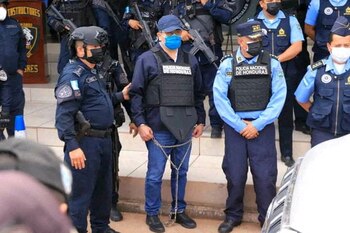
The control of political power to carry out drug trafficking activities has become an unfortunate reality in the Americas of the 21st century with rulers who have transformed their countries into narco-states. To have impunity, ending democracy in order to hold power indefinitely is the security sought by the heads of narco-states such as Cuba, Venezuela, Bolivia and Nicaragua, but where democracy alternates in power - as demonstrated in Honduras - crime can be separated from politics judging the heads of narco-states.
History shows that since about 1982 the relationship between Pablo Escobar, the Colombian drug trafficker, and Roberto Suarez Gómez, the Bolivian drug trafficker, developed with the Cuban regime, which made Cuba the first narco-state in the Americas. When it was discovered, it ended with the shooting of General Arnaldo Ochoa and Colonel Antonio de la Guardia to cover up the direct participation of Fidel and Raúl Castro, as detailed by “The Cuban Connection”, chapter 11 of the book Ayda Levy's testimony.
Drug trafficking is one of the most serious transnational crimes and there are three international treaties within the United Nations legal framework for world drug control: the Single Convention on Narcotic Drugs of 1961, as amended by the 1972 Protocol; the 1971 Convention on Psychotropic Substances; and the Convention against Trafficking Illicit Narcotic Drugs and Psychotropic Substances of 1988. The Convention against Transnational Organized Crime or Palermo Convention adopted in 2000 complements the system of combating crime.
Narco-states identify themselves because their rulers use the powers of “subject of international law” to defend illegal activity in forums and take measures to protect and benefit drug trafficking. In the 1960s, the dictatorship of Cuba proclaimed as “revolutionary action” to flood the United States with illegal drugs to liquidate youth, making drug trafficking a revolutionary action.
The leader of the illegal coca growers in Bolivia, turned head of the plurinational state, at the United Nations Assembly on Drug Trafficking in April 2016 proclaimed the “nationalization of the fight against drug trafficking”, that “the fight against drug trafficking is an instrument of US imperialism for the oppression of peoples”, defended — with coca leaves in hand — the expansion of the crops that coca which, with their “coca federations”, produce more cocaine.
The demonization of the United States “Drug Enforcement Administration” DEA has been and is one of the main strategies of drug trafficking through those in power in the countries they control. The DEA was expelled from Venezuela with Chávez-Maduro, from Bolivia with Morales, from Ecuador with Correa and accused by all the spokesmen of 21st century socialism as an instrument of imperialism.
In Honduras, the penetration of drug trafficking into politics was constant, but Juan Orlando Hernández institutionalized the narco-state. Hernández does not belong to the socialism group of the 21st century; he built his rise to power from a contrary position, in 2009 he participated in the dismissal of Zelaya, in 2010 he was president of the National Congress and with disputed elections in 2013 he assumed the presidency in 2014, with re-election also questioned in 2018
The case of former Honduran President Juan Orlando Hernández, now imprisoned and with extradition ordered for trial in the United States by federal process, three crimes associated with “conspiracy to traffic thousands of kilograms of drugs” in the Southern District of New York, makes him the first former head of a extraditable narco-state. It is the most important legal and political precedent for separating organized crime from politics.
Trials are ongoing in the Southern District of New York and Florida: “cartel of the suns” with Nicolás Maduro and part of his criminal group, with rewards of 15 to 10 million dollars for each accused; drug trafficking conspiracy against the former anti-narcotics chief of Evo Morales, Maximiliano Davila, with a reward of 5 million dollars and extradition; pending extradition in Spain the case of Hugo “el pollo” Carvajal former intelligence chief of the Venezuelan dictatorship; in trial the case of Alex Saab designated as “Maduro's front man”... and more.
The narco-states are in evidence and the Juan Orlando Hernández extradition order proves that IMPUNITY is the most important reason that the dictators of the narco-states of Cuba, Venezuela, Bolivia and Nicaragua cling to power.
*Lawyer and political scientist. Director of the Interamerican Institute for Democracy
KEEP READING:
Últimas Noticias
Debanhi Escobar: they secured the motel where she was found lifeless in a cistern
Members of the Specialized Prosecutor's Office in Nuevo León secured the Nueva Castilla Motel as part of the investigations into the case

The oldest person in the world died at the age of 119
Kane Tanaka lived in Japan. She was born six months earlier than George Orwell, the same year that the Wright brothers first flew, and Marie Curie became the first woman to win a Nobel Prize

Macabre find in CDMX: they left a body bagged and tied in a taxi
The body was left in the back seats of the car. It was covered with black bags and tied with industrial tape
The eagles of America will face Manchester City in a duel of legends. Here are the details
The top Mexican football champion will play a match with Pep Guardiola's squad in the Lone Star Cup

Why is it good to bring dogs out to know the world when they are puppies
A so-called protection against the spread of diseases threatens the integral development of dogs




